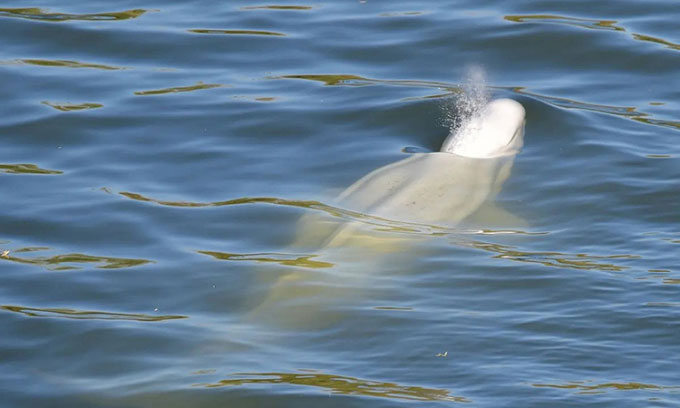The beluga whale, typically found in the frigid waters around the Arctic, swam into the Seine River last week and is struggling to return to the sea.
French rescue workers are attempting to save a beluga whale (Delphinapterus leucas) that is stranded in the Seine River, as reported by BBC on August 7. The animal was first spotted swimming in the river on August 2, about 70 km north of Paris.

Beluga whale swims into the Seine River, France. (Photo: Jean-François Monier/AFP)
After unsuccessful attempts to guide the beluga back to the sea, the rescue team has grown pessimistic about its chances of survival. They provided frozen herring and live salmon to the 4-meter-long whale, but it appears disinterested in eating.
Authorities are considering administering vitamins to the beluga to stimulate its appetite and assist it on a 160 km journey to the English Channel. From there, it could swim back to its natural habitat in the Arctic, where temperatures are colder.
Remaining in the warm river waters is detrimental to the beluga. “It needs to be moved within the next 24 to 48 hours,” stated Lamya Essemlali, head of Sea Shepherd France.
Essemlali also mentioned that the chances of survival for this weak beluga are very slim. “We all doubt the animal’s ability to return to the sea. Guiding it by boat would be extremely dangerous, if not impossible,” she said. However, the option of humane euthanasia has also been ruled out.
Some small spots appeared on the whale’s skin on August 6. However, experts are unsure if this is a reaction to the freshwater of the Seine—different from its natural saltwater habitat—or a sign that the animal’s health is deteriorating. They noted that the whale also exhibits signs of fear, surfacing only briefly and vocalizing less than usual.
Experts are also unclear how the beluga wandered so far from its cold natural habitat in the Arctic and sub-Arctic regions. This species sometimes swims south in the autumn for feeding, but it is rare for them to travel such distances.


















































